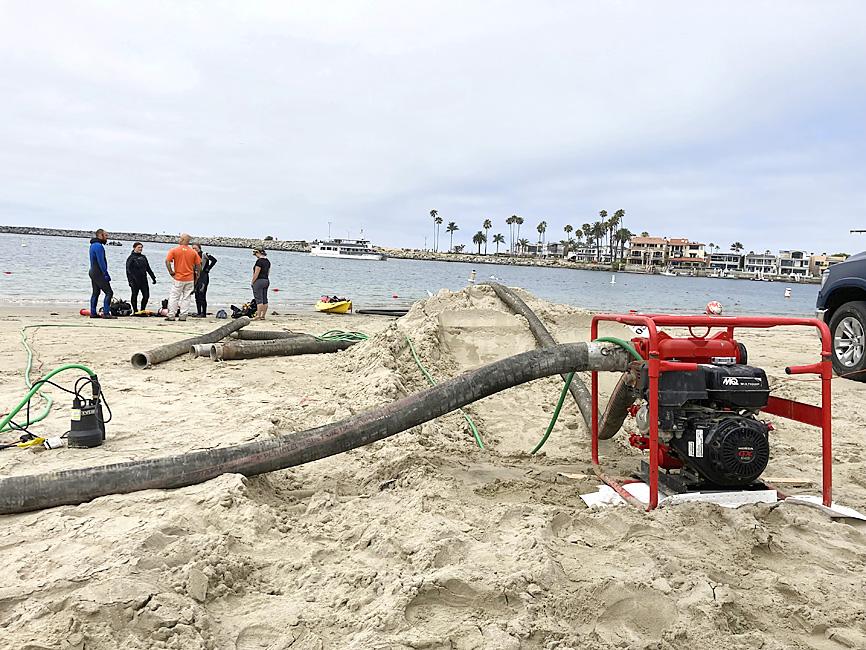For the first time, scientists say they have seen a species of bright green algae growing in the waters off California and they are hoping it is the last.
The invasive algae can overtake the environment and displace critical food sources for ocean animals on the southern California coast.
A team on Wednesday started removing a patch of the fast-growing algae, known as Caulerpa prolifera, from the harbor in Newport Beach, suctioning it through a tube and filtering the ocean water back out.

Photo: AP
The process was scheduled to take four or five days, and much longer until scientists can determine that the algae is gone for good.
So far, it has been confined to about 90m2 in an area not far from a small, but popular beach.
However, tiny fibers can easily break off and take hold elsewhere.
“We’re at a point here where we’ve got a shot to get rid of it,” said Robert Mooney, a biologist with Marine Taxonomic Services overseeing a large pump that a team of three divers uses to remove the algae.
“We don’t have the luxury of waiting to see what happens,” Mooney added.
The discovery of the species late last year and confirmation this spring spurred federal, state and local officials to act.
They are eager to prevent it from spreading, saying that the algae has invaded other habitats, such as the Suez Canal.
It was crucial to act quickly, because swimmers and boaters moving through the water could contribute to the algae spreading, they said.
California faced a similar problem two years ago when a related invasive algae was detected off the coast of Huntington Beach and Carlsbad. It cost US$7 million to eradicate and prompted the state to ban the sale of Caulerpa taxifolia and other algae.
That species — known as “killer algae” — has caused widespread problems in the Mediterranean Sea.
It is not edible by many fish and invertebrates, and can displace plants that are, Mooney said.
“It looks like somebody took a roll of AstroTurf and laid it out across the seafloor,” California Department of Fish and Wildlife official Christopher Potter said.
The algae recently identified in Newport Beach is related, but is not prohibited in California.
It is used in some saltwater aquariums, and scientists think it likely wound up in the harbor when someone washed out a fish tank, possibly into a storm drain.
“It’s more than likely the source is an aquarium release,” said Keith Merkel of Merkel & Associates, which is the biological consultant on the project.
“It can spread from very small fragments if you replace water in your aquarium, cleaning gravels and using buckets to dip water out and in,” Merkel said.
For now, the source has not been confirmed, and the push is on to remove the algae as quickly as possible from Newport’s China Cove.
While native to Florida and other tropical locations, it can overtake natural habitats in California, experts said.
So far, divers have not detected the algae elsewhere in the harbor, but it will require surveys over time to be sure, and repeat removals if more is detected, Merkel said.
“There’s a good chance that it has spread, we just don’t know where — which is the biggest fear that we have,” Merkel said.

‘IN A DIFFERENT PLACE’: The envoy first visited Shanghai, where he attended a Chinese basketball playoff match, and is to meet top officials in Beijing tomorrow US Secretary of State Antony Blinken yesterday arrived in China on his second visit in a year as the US ramps up pressure on its rival over its support for Russia while also seeking to manage tensions with Beijing. The US diplomat tomorrow is to meet China’s top brass in Beijing, where he is also expected to plead for restraint as Taiwan inaugurates president-elect William Lai (賴清德), and to raise US concerns on Chinese trade practices. However, Blinken is also seeking to stabilize ties, with tensions between the world’s two largest economies easing since his previous visit in June last year. At the

UNSETTLING IMAGES: The scene took place in front of TV crews covering the Trump trial, with a CNN anchor calling it an ‘emotional and unbelievably disturbing moment’ A man who doused himself in an accelerant and set himself on fire outside the courthouse where former US president Donald Trump is on trial has died, police said yesterday. The New York City Police Department (NYPD) said the man was declared dead by staff at an area hospital. The man was in Collect Pond Park at about 1:30pm on Friday when he took out pamphlets espousing conspiracy theories, tossed them around, then doused himself in an accelerant and set himself on fire, officials and witnesses said. A large number of police officers were nearby when it happened. Some officers and bystanders rushed

Beijing is continuing to commit genocide and crimes against humanity against Uyghurs and other Muslim minorities in its western Xinjiang province, U.S. Secretary of State Antony Blinken said in a report published on Monday, ahead of his planned visit to China this week. The State Department’s annual human rights report, which documents abuses recorded all over the world during the previous calendar year, repeated language from previous years on the treatment of Muslims in Xinjiang, but the publication raises the issue ahead of delicate talks, including on the war in Ukraine and global trade, between the top U.S. diplomat and Chinese

RIVER TRAGEDY: Local fishers and residents helped rescue people after the vessel capsized, while motorbike taxis evacuated some of the injured At least 58 people going to a funeral died after their overloaded river boat capsized in the Central African Republic’s (CAR) capital, Bangui, the head of civil protection said on Saturday. “We were able to extract 58 lifeless bodies,” Thomas Djimasse told Radio Guira. “We don’t know the total number of people who are underwater. According to witnesses and videos on social media, the wooden boat was carrying more than 300 people — some standing and others perched on wooden structures — when it sank on the Mpoko River on Friday. The vessel was heading to the funeral of a village chief in